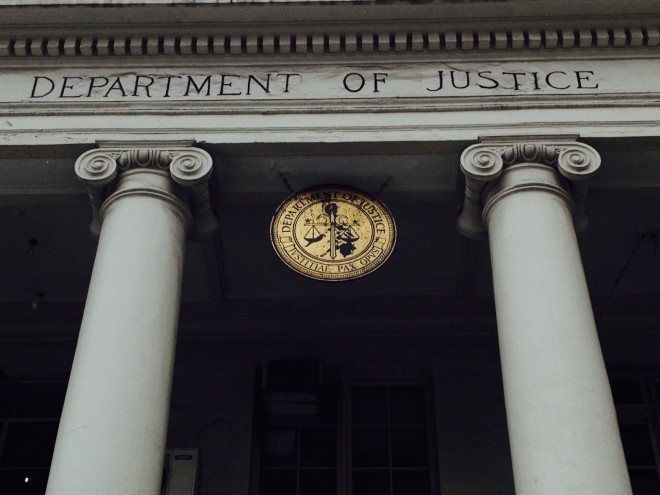
The Department of Justice. (Photo by RYAN LEAGOGO / INQUIRER.net)
MANILA, Philippines — There has been no request from individuals designated as “terrorists” by the Anti-Terrorism Council (ATC) to be removed from the controversial list, a Department of Justice (DOJ) official revealed.
According to DOJ Undersecretary Adrian Ferdinand Sugay, as far as he knows, none of the listed terrorists — consisting of 19 alleged ranking communist rebels and 10 wanted leaders of Islam extremist groups — have formally asked to be removed from the list.
“The internal mechanism for designation also contains provisions re: delisting. We are proposing a few additional provisions and this will hopefully be taken up during the next ATC meeting. As far as I know, no request for delisting has been received by the ATC,” Sugay told reporters.
“I have not been informed of any request made,” he added.
Last May 14, the ATC — the council mandated by the Anti-Terrorism Act that amended the Human Security Act of 2007 — passed resolutions declaring the said group of individuals as terrorists.
While Armed Forces Chief of Staff Gen. Cirilito Sobejana backed the ATC’s move, claiming that it would boost government efforts to avert acts of terror, several lawyers of peace consultants who were included in the list claimed that the action was merely red-tagging, or linking ordinary individuals to communist rebels.
READ: CPP on being labeled as terrorists: ‘A precursor for heightened fascist suppression’
Sugay said that people listed on the so-called terror list may file for delisting within 15 days after their designation was published.
“Verified request for delisting may be filed within 15 days from publication of designation,” he said.
“As a general rule, a request for delisting may be filed as often as the grounds therefor are discovered. No request may, however, be filed within 6 months from the time of denial of a prior request,” he explained.
He also reminded that listed individuals risk waiving their right to file a request if they will not seek to delist within the said period.
“If no request has been filed, it may be reasonably presumed that they have,” Sugay said. “Judicial recourse is always an option. Whether or not the court in question will entertain is another matter altogether.”
Last May 17, the Supreme Court wrapped up the debates between those who questioned the constitutionality of the Anti-Terrorism Act, and those who staunchly defended it.
READ: SC wraps up debate with show cause vs one of Anti-Terror Law petitioners
The said law is being contested based on fears by administration critics that it may be used to stifle dissent by using it against the opposition. Under the said law, there are wider scopes to who may be considered a terrorist, and what terrorist acts are.
However, several supporters of the law insisted that there are enough safeguards to ensure that abuses would not be committed.
READ: Robredo: None of COVID-19 problems can be solved by Anti-Terror Bill

